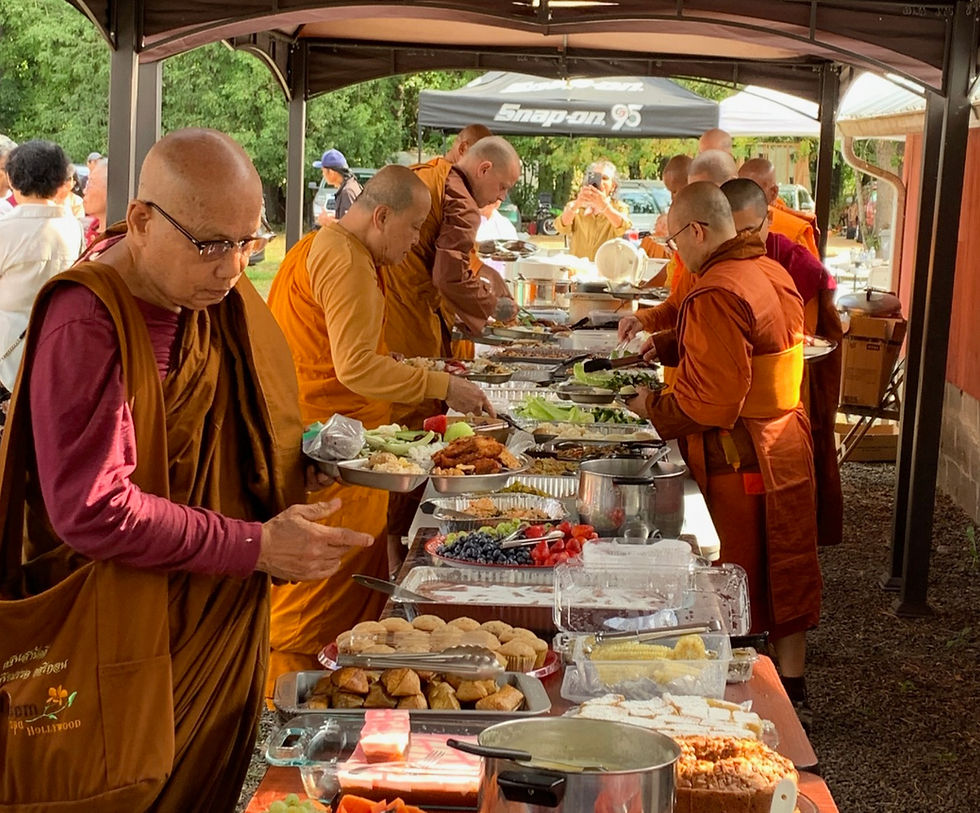Pātimokkha Ceremony
- N L
- Sep 7, 2025
- 3 min read
Today was not a regular Sunday at LP Chalee Hermitage. Instead of our usual meditation and Dharma talk, the temple was alive with one of the most important gatherings in the Buddhist tradition, the Pātimokkha ceremony.
The day actually began yesterday, with everyone working together to set up tents, tables, and chairs. When I arrived this morning, I could already feel the energy, like the community itself was breathing in unison.
Pātimokkha is held twice a month, on the full moon and new moon days, when monks come together to recite the 227 rules of conduct that guide their lives. These rules were not created all at once. More than 2,500 years ago, the Buddha laid them down gradually, often in response to specific situations that arose in the early monastic community. After the Buddha’s passing, the rules were gathered and compiled into the formal code we know today. What amazes me is that these same rules are still being recited and followed now, halfway across the world, in Oregon.
The day unfolded beautifully. Laypeople gathered in the Sala, and 16 monks from six temples in Oregon and two from Washington joined together in Pali chanting. I could feel the resonance; the sound carried a kind of timeless calm, as if it was echoing from the past into the present. Afterward, everyone went outside to offer food to the monks. They ate first, as is tradition, and then we all shared lunch together. Later, the monks returned to the Sala to privately recite the 227 rules, and the day closed with blessings for the lay community.
And let me pause here to talk about the food, because it was a feast of Thai flavors. I haven’t eaten boat noodle in years, but today I finally got to enjoy a bowl. Boat noodle has an interesting history. Originally sold from small boats along the canals of Thailand, the bowls were intentionally made small so they wouldn’t spill when passed from boat to boat. In a way, it feels like an analogy for Buddhism itself: life can be vast and overwhelming, but practice invites us to take it in small, mindful portions. Just like those little bowls, the five precepts and teachings give us manageable steps, guiding us through the waters of daily life without capsizing.
Alongside the noodles, there were sweet and savory treasures. One of the desserts was taro in syrup, the kind that melts into its sweetness as the syrup soaks into the root. In Thailand, you often see the same style with cassava, boiled and candied until glossy and tender. It’s simple but deeply satisfying, much like Thai hospitality itself. Then there were Thai fish cakes, ทอดมันปลา, crispy, golden, and full of flavor from curry paste and kaffir lime leaves. They reminded me of my mom’s fish cakes, which she always made fresh. The memory of her cooking added an extra layer of warmth to the meal, a taste of home within the celebration.
As I sat there, tasting these familiar flavors, I thought about how much discipline and compassion is contained in this tradition. For laypeople, the Buddha gave us five precepts as a foundation: no killing, no stealing, no sexual misconduct, no lying, no intoxicants. Sometimes, on days like this, people also keep the eight precepts, adding further simplicity and restraint. Some of these are easy to follow, but others, like refraining from lying or not taking what is not given, challenge us because they touch directly on our attachments and desires. Now imagine holding not just five or eight, but all 227 precepts. That is the life of a monk, and it gives me deep respect for their path.
I was born in the early 70s, back when there were no cell phones. I watched the world change - giant first-generation mobile phones, the rise of the internet, the arrival of iPhones and iPads, and now the age of AI. Technology moves forward at dizzying speed, yet these precepts haven’t changed at all. They are like an anchor, holding steady through centuries of transformation, reminding us of the values that remain timeless: honesty, restraint, mindfulness, and compassion.
Today’s Pātimokkha was more than just a ceremony. It was the sound of ancient chants still resonating in modern times, the taste of boat noodles, taro in syrup, and Thai fish cakes connecting me to my roots, and the sight of a community moving as one. It reminded me that the teachings of the Buddha are not only preserved, they are alive, practiced, and waiting for us to join in. And as a bonus, I met new people today and enjoyed their company, which made the whole experience even richer.





Comments